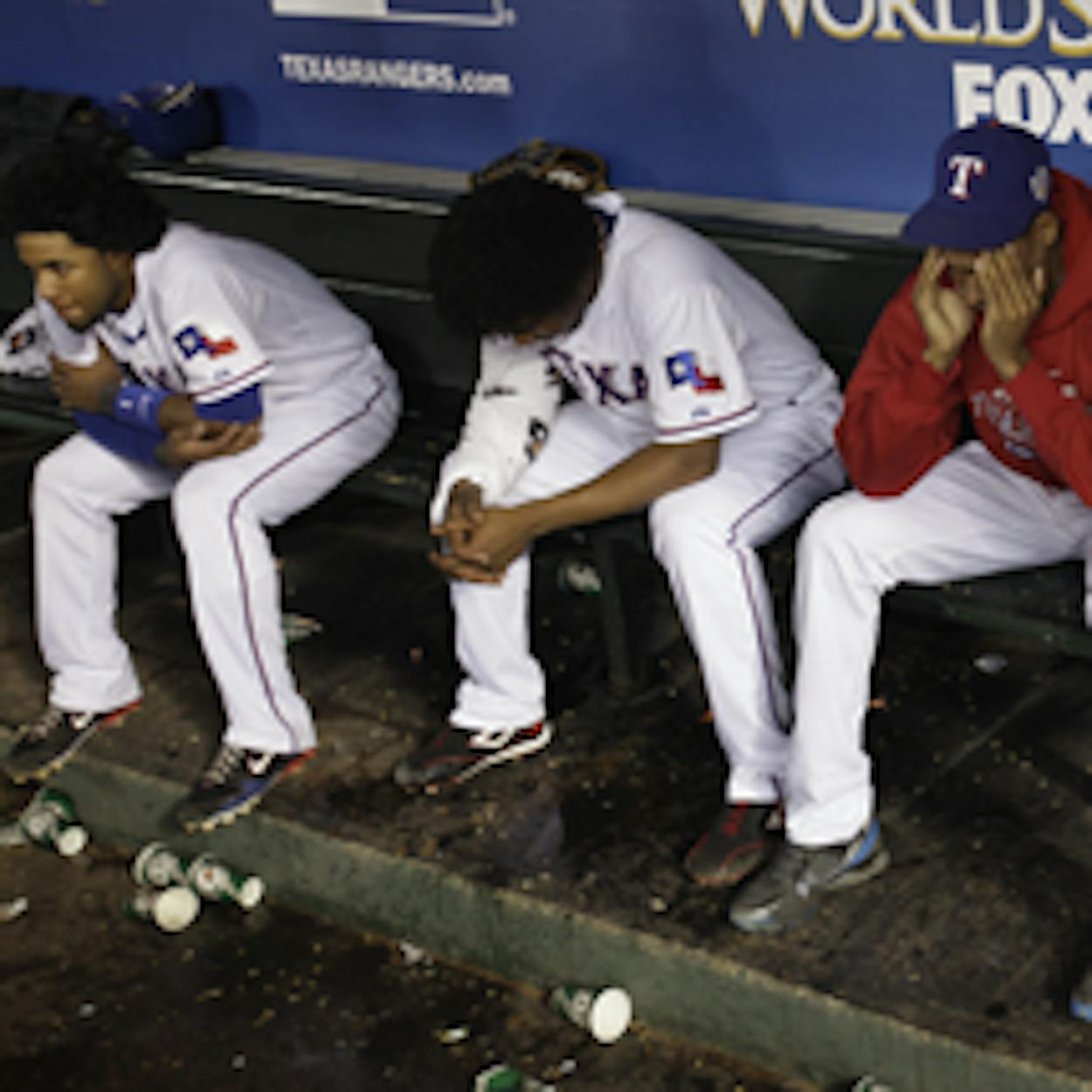With apologies to Tony Bennett, the Texas Rangers left something important in San Francisco as well. As a result, their World Series dream season ended in Arlington on Monday night with a 3-1 loss to the Giants.
The Rangers’ bats, which carried the team to historic postseason firsts—a playoff victory, a division series win, and an American League pennant—never left the Bay Area for the return trip to Arlington.
After an 11-7 loss in Game 1, Texas scored in only three of their remaining 35 at-bats. That’s a total of five runs over the final four games of the series, including shutout losses in Games 2 and 4. During that stretch, the Rangers scratched out a total of 18 hits. You don’t have to be Jon Daniels or understand advanced baseball sabermetrics to conclude that if you don’t score any runs, you can’t win.
Texas’ offensive woes reached unprecedented proportions. When Nelson Cruz finally broke through with a home run in the bottom of the seventh inning of Game 5, that snapped a streak of 18 1/3 scoreless innings. The Rangers’ biggest bats were among the hardest hit. MVP candidate Josh Hamilton went 2-for-20 and cleanup hitter Vladimir Guerrero went 1-for-14.
Certainly, Texas’ offensive meltdown wasn’t all their own doing. San Francisco got top-level performances from three pitchers: Matt Cain, Madison Bumgarner, and Tim Lincecum. Cain threw 7 2/3 shutout innings in Game 2 and had a 0.00 ERA in this postseason. Bumgarner, a 21-year-old rookie, pitched beyond his years with a three-hit shutout in Game 4. And Lincecum, the Giants’ ace who bears an uncanny resemblance to Wiley Wiggins’ character in a certain Richard Linklater movie, had Texas dazed and confused through eight innings in last night’s clincher.
For all the talk of hair and beards and thong underwear, this season was known as the Year of the Pitcher, and San Francisco was the best of the best. The Giants had the lowest earned-run average in the major leagues, the most strikeouts, and held opposing teams to the lowest batting average.
It may not have mattered given Texas’ anemia at the plate, but the Rangers’ failed to catch a break at any critical juncture. Part of that was just plain bad luck, as when Ian Kinsler’s Game 2 shot to center field glanced off the top of the wall at AT&T Park and back into the field of play. Another two inches and that ball would have been a home run that put the Rangers ahead. And what else but bad luck explains the Texas bullpen performance later in that game, as four straight walks and three more hits turned a 2-0 nail-biter into a 9-0 blowout?
But some of the Rangers’ wounds were self-inflicted, courtesy of manager Ron Washington. Wash is beloved by his players, team management, and fans: What other Texas manager inspires Halloween costumes and T-shirts in his image? But time and again, his in-game decisions backfired.
Opening the Series in a National League park, Washington chose to keep Guerrero’s bat in the lineup and put the regular designated hitter in right field. Guerrero committed a pair of errors that led to Giant runs. The following night, Washington took Guerrero out of the lineup and the Rangers’ batting order looked out of sorts and off-balance without one of their leading run-producers.
Then there was the handling of closer Neftali Feliz in the two early losses. That is, the Rangers’ best reliever never saw the mound as the rest of the bullpen couldn’t keep close games from blowing open. Watching Feliz shut down the Giants in the final two innings last night made those early decisions sting a bit more.
On the other hand, San Francisco manager Bruce Bochy couldn’t go wrong. Everything he did, from lineup switches to pitching rotations to letting his hitters swing away at opportune times, worked in his favor. Edgar Renteria, the 35-year-old shortstop who last won a World Series 13 years ago, won series MVP honors—his three-run home run clinched the series in Game 5 and gave San Francisco its first title since 1954.
It’s difficult for Rangers fans to feel the same animosity toward the Giants as they do toward, for example, the Yankees. Ousting the evil empire to win the AL crown was the highlight of the Rangers’ best season ever. And while the hurt of a World Series loss will stick around for a while, the memory of some of the most special moments in franchise history should be enough to keep fans warm throughout the winter.
And as we wait for the first pitch of the 2011 season, there are plenty of questions to keep us occupied. On top of the list is what happens to Cliff Lee? Despite a misstep in the series opener, Lee delivered what Texas asked for: three postseason victories and a fourth outing that gave them the chance to extend the series. Now can the Rangers come up with the money to keep Lee? Or will he be pitching in another uniform—even for the hated Yankees—next season?
Texas advanced to the Fall Classic with a crafty meshing of a few superstars, some emerging young talent, and a few spare parts. It’ll take a few key acquisitions to keep the success going, and give fans a chance to see their team playing into November again.







